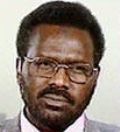Darfur peace talks stall as belligerents refuse to sit together
By DANIEL BALINT-KURTI
ABUJA, Nigeria, June 11, 2005 (AP) — Sudan’s government and Darfur rebels refused to sit in the same room at peace talks Saturday, arguing over which countries should be represented at negotiations to end one of the world’s biggest crises.
 The latest row has heightened distrust at the talks, a day after they were officially launched at a luxury hotel in Nigeria’s capital, Abuja. African Union negotiators were “in intense consultations with the parties” to resolve the issue, said AU spokesman Mezni Nourredine.
The latest row has heightened distrust at the talks, a day after they were officially launched at a luxury hotel in Nigeria’s capital, Abuja. African Union negotiators were “in intense consultations with the parties” to resolve the issue, said AU spokesman Mezni Nourredine.
The dispute between Sudan’s government and the two rebel groups over the presence of Eritrea and Chad prevented a scheduled Saturday meeting, where the African Union’s special envoy for Darfur Salim Ahmed Salim was due to chair a discussion on the talks’ agenda.
Delegates said Sudan was objecting to the presence of Eritrea, seen as close to the rebels, as an observer. “There are procedures for admission, and all parties have to be consulted,” said Abdel Kalil, Sudan’s ambassador to Nigeria, when asked whether he objected to Eritrea’s presence. He declined to comment further.
Meanwhile, the delegation from Sudan’s western neighbor, Chad — a key mediator in the talks — has not arrived.
A Western diplomat said Chad’s no-show was linked to a dispute with the rebel Justice and Equality Movement, which says Chad should withdraw from the talks as it is too close to Sudan’s government.
However, Chad’s top negotiator, Allam Mi-Ahmed, said by phone from the capital N’Djamena that he had only been delayed because no planes were available, and he would arrive by Monday.
At the same time, Ahmed attacked the Justice and Equality Movement delegation — which is dominated by Darfur exiles — as being “hotel opponents” who had little on-the-ground experience, and complained that the African Union had not invited an alternative Darfur-based leader, Mohammed Saleh Hakim.
Previous peace accords have so far failed to end conflict in Sudan’s western Darfur region, which has led to an estimated 180,000 deaths. Around 2 million others have fled into the bush or relief camps in Darfur or neighboring Chad.
The conflict began when mainly ethnic African rebels launched a February 2003 uprising against what they say were decades of marginalization and neglect. Sudan’s Arab-dominated government and pro-government Arab tribal fighters are accused of launching coordinated attacks on ethnic African farmers in retaliation, causing the bulk of the deaths and displacements.
Sudan denies targeting civilians or allying with the Janjaweed militia. The United States has accused the government and militias of committing genocide.
Sudanese officials have said the government is determined to resolve the Darfur crisis this time around. But they also have set themselves at loggerheads with the U.N.-backed International Criminal Court by opposing its recently opened investigation of war crimes in Darfur.
Both rebel groups — the Sudan Liberation Army and the Justice and Equality Movement — have welcomed the International Criminal Court’s investigations.
The 53-nation African Union brokering the peace parley will also try to end fighting among rebels who are united in their opposition to the government but divided over their vision of the region’s future.
NATO defense ministers finalized plans this week for the alliance’s first African mission, agreeing to fly 5,000 African peacekeepers to Darfur.
While the allies will fly the troops into Darfur — it is hoped before the rains come in July — they stressed the AU remained in charge of the peacekeeping operation. The AU now has some 2,700 peacekeepers in Darfur.
